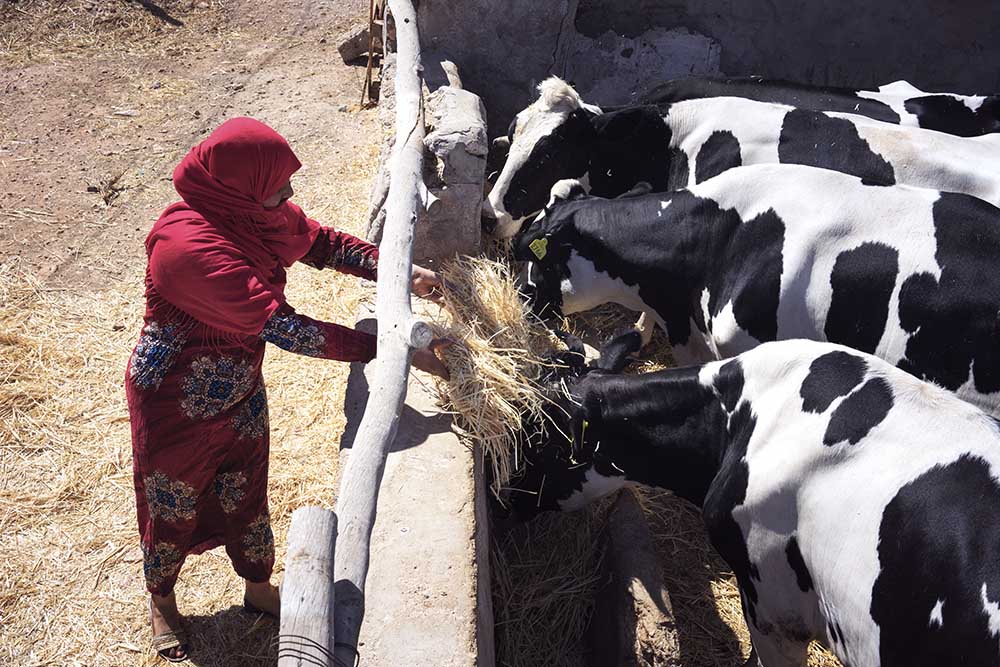- About
- Key Issues
Labor & Rural Policy
Sustainability
Animal Health
Nutrition & Food Safety
Labeling & Standards
- Programs & Resources
- Advocacy
- News
- Membership
- Events
- Stay Informed
- Contact
U.S. Dairy Builds Sustainable Food Systems
The United Nations (UN) is convening a Food Systems Summit this September, with agriculture and sustainability central to the discussion. NMPF is working with colleagues at Dairy Management, Inc. and the U.S. Dairy Export Council to make sure U.S. dairy’s leadership is recognized and partnering with other organizations to highlight the nutritional value of dairy and sustainability advances already achieved by the sector, a leader in U.S. farm stewardship.
U.N. agreements and declarations influence government policies and regulations worldwide, making the summit a crucial opportunity to spotlight the real-life work U.S. dairy farms to each day to nourish the planet and keep it healthy in every way.
The dairy community, through the hard work of farmers and support for their efforts throughout the entire supply chain, has a proactive, positive story to tell. Dairy plays a vital role in sustainable, equitable and secure food systems, nourishing people, the planet, and communities around the world. The 2021 Food Systems Summit offers an opportunity to tell our story, which is essential as important decisions are made.
Dairy Is Fundamental to Good Nutrition
Milk and dairy products are nutrient-dense, providing high-quality protein and micronutrients in an easily absorbed form that can benefit nutritionally vulnerable people as well as healthy people when consumed as part of healthy eating patterns.
The variety of nutrient-rich dairy foods available offers something for almost everyone’s wellness and taste needs. Milk packs 13 essential nutrients in each serving, including protein, zinc, selenium, vitamin A and vitamin D, which contribute to healthy immune function. And dairy foods like cheese and yogurt also provide high-quality protein, calcium, vitamin A, B vitamins and more.
Eating a balanced diet with a variety of foods to get essential nutrients is essential to maintain healthy gut and immune function and optimize overall wellness. Dairy is safe, delicious, affordable, accessible and an important part of local food cultures throughout the world.
U.S. Dairy Leads in Environmental Stewardship
U.S. dairy farmers have long been stewards of their animals and their land, air, and water resources, and they are passionate about continuously improving how they care for the planet and its people. In 2008, dairy was the first U.S. agricultural sector to conduct a full life-cycle assessment at a national level, which showed it contributes just 2% of all U.S. greenhouse gas emissions. Thanks to increasingly modern and innovative dairy farming practices, the environmental impact of producing a gallon of milk in 2017 shrunk significantly from a decade earlier, requiring 30% less water, 21% less land and a 19% smaller carbon footprint than it did previously.
The dairy community is committed to conserving natural resources and making further progress. The industry’s 2050 goals support a vision that dairy is an environmental solution, addressing the areas where U.S. dairy collectively can have the greatest impact. The U.S dairy industry’s goals are to become carbon neutral or better, optimize water use while maximizing recycling, and improve water quality by optimizing utilization of manure and nutrients.
Dairy Supports Strong, Thriving Communities
U.S. dairy farmers and their cooperatives work hard every day to contribute to communities worldwide by broadening access to nutritious dairy foods for the growing number of people facing food insecurity. In 2020, the dairy community partnered with local food banks to deliver 469 million pounds of dairy to families in need through Feeding America alone.
The U.S. dairy community supports more than 3 million total jobs, directly employing almost one million individuals and indirectly supporting more than two million additional jobs. 95% of U.S. dairy farms are family-owned and operated, many of which are multigenerational and critical contributors to rural economies.
Join the Conversation
Engage in the Twitter Discussion
Join NMPF and others in the global dairy community in emphasizing dairy’s role in sustainable, equitable and secure food systems using the hashtags #UNFSS2021 and #FoodSystems on Twitter.
Become a Food Systems Hero
Complete this form to become a Food Systems Hero. By signing on, you commit to learn, share, gather and act for food systems transformation. In the leadup to, as well as during the Summit, you will receive the latest news, communication toolkits, instructions on how to organize an independent Food Systems Summit Dialogue and ways you can take action.
About the Food Systems Summit
This September, the United Nations will convene a Food Systems Summit as part of the Decade of Action to achieve the Sustainable Development Goals (SDGs) by 2030. The Summit brings together key players from the worlds of science, business, policy, healthcare and academia, as well as farmers, consumer groups, environmental activists, and more. Before, during and after the Summit, these stakeholders will come together to bring about tangible changes to the world’s food systems.
The Summit aims to deliver the following outcomes:
- Identify solutions and leaders and issue a call for action at all levels of the food system, including national and local governments, companies and citizens.
- Raise awareness and elevate public discussion about how reforming our food systems can help achieve SDGs by implementing reforms that are good for people and planet.
Develop principles to guide governments and other stakeholders looking to leverage their food systems to support the SDGs. - Create a system of follow-up and review to ensure that the Summit’s outcomes continue to drive new actions and progress.






